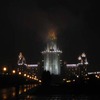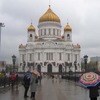New Smoking Ban Stokes Debate
Russian smokers will soon be forced to take to the streets to enjoy a cigarette once the new law comes into force. President Vladimir Putin recently signed a law prohibiting smoking in public places. The legislation is due to come into force in July 2013 with a ban in schools, hospitals, airports and the public areas of apartment buildings. In July 2014 it will become illegal to smoke in cafes, restaurants and bars. Other provisions limit the display of cigarettes at the point of sale as well as sales from kiosks.
In a country with one of the world’s highest rates of smoking (40 percent of Russia’s adult population smoke), the effects of the public smoking ban will be widespread and complex, with ramifications for industry sectors such as hospitality.
Pavel Shteinlukht, co-owner of the city’s popular Terminal Bar on Ulitsa Rubinsteina, expressed concern about the impact the new legislation would have on local bar owners, admitting that the majority of their customers smoked. He called the new laws unpredictable and artificial for Russia.
The same argument is made by tobacco company Philip Morris International, one of three firms — the other two are Japan Tobacco Inc. and British American Tobacco — that account for about 87 percent of a market in Russia that is estimated at $14.5 billion.
“Public smoking restrictions are absolutely appropriate, including bans in many locations,” said a company representative. “However, in restaurants, bars and entertainment establishments, proprietors should have the freedom to accommodate both non-smokers and smokers and decide whether to permit, restrict, or prohibit smoking.”
Both tobacco companies and local businesses have expressed concern over the opportunities the new legislation will present for criminal activity. Proponents of the legislation argue that it will reduce the use of tobacco in society, improving Russians’ health and reducing medical costs.
 Podium
Podium





